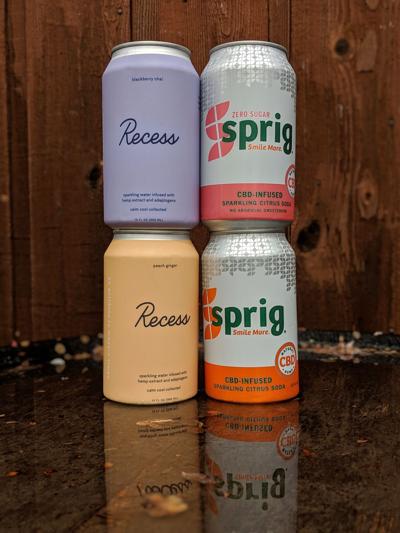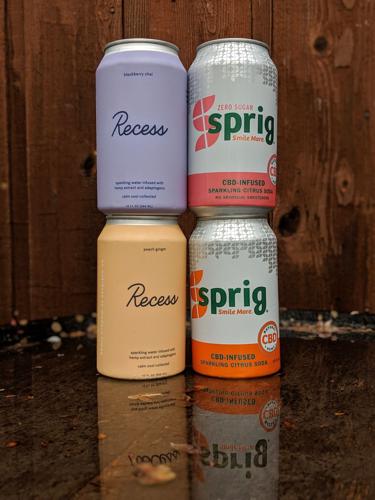It’s likely you’ve heard about the availability of products on the market right now that contain cannabidiol, or CBD, a chemical compound found in the cannabis plant. There are even seltzer waters with these extracts added.
The Cannabis genus is snugly nestled within the Cannabaceae family along with the beer-brewing darling, Humulus — better known as hops.
While the oils and resins present in hops are used to give bittering, aroma and flavor to beer, the cannabis plants’ CBD oils offer a whole different kind of experience. Some say it eases all sorts of ailments of the nervous system, along with a general improvement in memory and mood thanks to its bond with our bodies’ endocannabinoid system.
The usefulness of cannabis has been known and recognized in this nation since well before the American Revolution. In fact, Lancaster and York counties were pivotal centers of the cultivation and processing of hemp, a member of the Cannabis sativa family. In his book “Hempstone Heritage I: In Accordance with Their Wills,” Pennsylvania hemp historian Les Stark writes that “between 1720 and 1870, there were over 100 water- powered hemp-processing mills in Lancaster County alone! There were almost as many oil mills for processing hempseed oil and flaxseed oil as well.”
The Cannabis sativa family also includes marijuana, which contains THC (tetrahydrocannabinol), the psychoactive properties we associate with the recreational uses of the plant.
For a long time, the cultivation of hemp was viewed as an essential element of colonial life. However, it went from being a plant required by a Virginia Assembly law passed in 1619 to be grown by all farmers for its utilitarian value to the adoption of the name marijuana and being demonized for decades.
A 1994 story in The Atlantic magazine called “Reefer Madness” asserts that “the political upheaval in Mexico that culminated in the Revolution of 1910 led to a wave of Mexican immigration to states throughout the American Southwest. The prejudices and fears that greeted these peasant immigrants also extended to their traditional means of intoxication: smoking marijuana.”
Colloquially speaking, marihuana was the name given to cannabis by these Mexican immigrants, just like hemp was what those early colonists called it. While both marijuana and hemp are Cannabis sativa, industries have spent years cultivating the crops for their intended purposes – to increase or decrease the levels of THC.
Anti-drug efforts reached the newspapers. A 1931 headline in an Alexandria, Louisiana, newspaper advises readers that the “Medical Society Meets: Discussing Marijuana Menace.” Another, in a 1935 San Bernardino, California, newspaper, reads “Fight Against Marijuana Menace Is Progressing.” a fight before it even became illegal.
Cannabis was well on its way to becoming illegal when President Franklin D. Roosevelt signed the prohibitive Marihuana Tax Act of 1937.
Fast forward to today and we have the re-emergence of agricultural hemp, our nation’s founding crop, thanks to the 2018 Farm Bill. And CBD products, which do not produce the “high” caused by THC, are now being offered in a variety of forms for all kinds of ailments across the country.
CBD products on the market largely promise rigorous third-party testing to ensure they’re free of pesticides, other chemicals, heavy metals and to discern if there is any THC in it. Some are marketed as containing trace amounts of THC and other plant parts while others claim to contain 0% THC, rendering it safe for those who may undergo drug testing or just want to avoid any potential psychoactive properties. Until there’s a standard regulation on these products, it kind of feels like the Wild West. Who do you trust?
While the Federal Drug Administration’s official stance remains that more tests, studies and research need completed before approving CBD products currently being sold at your favorite natural health or supplement shop, there are countless ways in which CBD has fluidly made its way into mainstream use. From tinctures, gelcaps and salves to gummies, smoothies and seltzers, CBD has been reported by many individuals as being way more than just snake oil — although, with that lack of any kind of government-directed standardized testing, it’s wise to do your own research into the products you’re considering purchasing, and always buy from a trusted merchant.
The Alcohol and Tobacco Tax Trade Bureau as of April 2019 advises it’s “in the process of updating its guidance on the use of ingredients from hemp,” but as it’s consulting with the FDA, it’s anyone’s guess when or even if you’ll start seeing CBD formally allowed as an ingredient in beer anytime soon. The FDA on May 31 will be holding a public hearing concerning the safety of cannabis products, so there might be more solid information about brewing with CBD after that hearing.
I sampled four different flavored seltzer waters purchased from The Green Bee on McGovern Avenue in Lancaster. Two were made by Sprig and the others were from Recess.
Sprig adds 20 milligrams of CBD derived from agricultural hemp in every can of its seltzer. Recess puts 10 milligrams of agricultural hemp-derived CBD, along with the adaptogens American ginseng, L-Theanine and schisandra, in its product.
The Sprig seltzers tasted just like their flavors should. I tried the Citrus flavors for both; the one contained cane sugar and the other was sweetened with stevia. I preferred the cane sugar because the orange flavor was juicier and, well, sweeter. The stevia had just that little touch of greenness that only a plant sugar substitute can impart. These were both highly effervescent and a light peachy pink with slight haze.
In the Recess line, I sampled the blackberry chai and peach ginger. Blackberry chai was an instant delight with its prominent chai spices like ginger, cinnamon, vanilla and cardamom. It was berry-sweetened, spicy and exciting. Peach ginger tasted exactly like what you’d expect from a peach ginger tea, although a bit thinner in the body and reminding me of peach gummy rings. These Recess drinks were not as highly carbonated.
While I didn’t experience any monumental life-altering brilliance from drinking these sodas, I did notice that sinus congestion caused by a recent cold entirely went away and a headache I’d been struggling with for days disappeared.
I’m far from any sort of expert on CBD and cannabis, but recognize that many friends and acquaintances say they have found profound relief from its use. Has CBD benefited you?
Contact Amber DeGrace with comments and questions at adegrace@lnpnews.com and find her on Twitter at @amberdegrace.
Other coverage:
Lancaster Farming is launching a podcast with the story of a crop whose time may have finally come -- industrial hemp.


 AMBER DeGRACE | Staff Writer
AMBER DeGRACE | Staff Writer

 JENNIFER KOPF | Staff Writer
JENNIFER KOPF | Staff Writer
 CHAD UMBLE | Staff Writer
CHAD UMBLE | Staff Writer
 HEATHER STAUFFER | Staff Writer
HEATHER STAUFFER | Staff Writer![Lancaster Farming launches podcast series on industrial hemp [podcast]](https://bloximages.newyork1.vip.townnews.com/lancasteronline.com/content/tncms/assets/v3/editorial/a/cf/acf05108-a4ac-511c-8bcd-13b123949a12/5b92bf5373dfd.image.jpg?crop=768%2C539%2C26%2C54&resize=150%2C105&order=crop%2Cresize)


